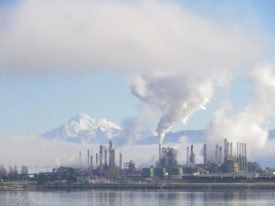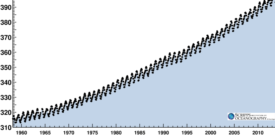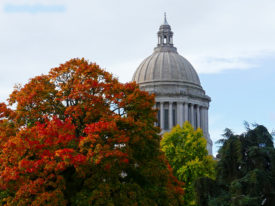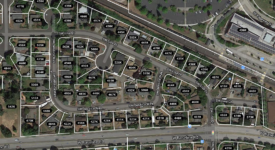Eric dP:
My favorite piece of the week was republican meteorologist Paul Douglas explaining why climate change is real and frightening, and why it shouldn’t be treated as a partisan issue.
EarthFix reporters Amelia Templeton and Bonnie Stewart have a terrific feature on the history and future of coal in Coos Bay, Oregon. Among other fascinating elements, we see that Oregon’s state economist acknowledges that coal exports will yield little benefit for jobs or the overall economy.
I loved Erica C. Barnett’s recapitulation of the contents of a 1962 time capsule from the Seattle city council. Maybe it’s just me, but they sound a bit like a bunch of kooks:
“In the year 2,012 Seattle will either be a mighty metropolis of more than 1,000,000 residents—or it will have become a charred, deserted relic of a fearful age of nuclear warfare.”
Alan:
350.org’s latest video is about connecting the dots between the victims of global warming with the fossil-fuel companies that are blocking change.
Frank Bruni’s NYT piece on the evolutionary roots of the obesity epidemic is arresting: He quotes “Michael L. Power and Jay Schulkin in their book ‘The Evolution of Obesity.’ ‘We evolved on the savannahs of Africa,’ they write. ‘We now live in Candyland.’” (It also ran in Sightline Daily.)
University of Oregon grad student Derek Watkins has an intriguing blog, where he posts animated and interactive maps, like one of global population density and another that shows US settlement history by portraying the openings of post offices over time. (Sightline friend Serena Cruz Walsh brought it to my attention.)
Clark:
Here’s a cool TEDx presentation by a Portland-based entrepreneur and bike enthusiast on his vision for a sustainable transportation system. His key idea is that there’s not just one key idea. Instead, we’ll have to combine dozens of ideas and insights from different domains: the form factor and light weight of bikes; the car-optional lifestyles made possible by car sharing services such as ZipCar and Getaround; advances in battery and electric drives, made possible by the most recent round of electric car development; and better information technology, including Google’s pursuit of safer, computer-piloted vehicles. There’s a pie-in-the-sky feel to his presentation—except when you realize how close we already are to some of the advances he’s envisioning.
Depressing news on income inequality from economist Emmanuel Saez. Apparently, during the early economic “recovery” from 2009 to 2010, a full 93 percent of income gains went to the top-earning 1 percent of households.
I so want this to be true: a new report from the consulting firm McKinsey & Company…
…finds that underlying PV costs are likely to continue to drop as manufacturing capacity doubles over the next three to five years. Indeed, the cost of a typical commercial system could fall 40 percent by 2015 and an additional 30 percent by 2020, permitting companies to capture attractive margins while vigorously installing new capacity.








